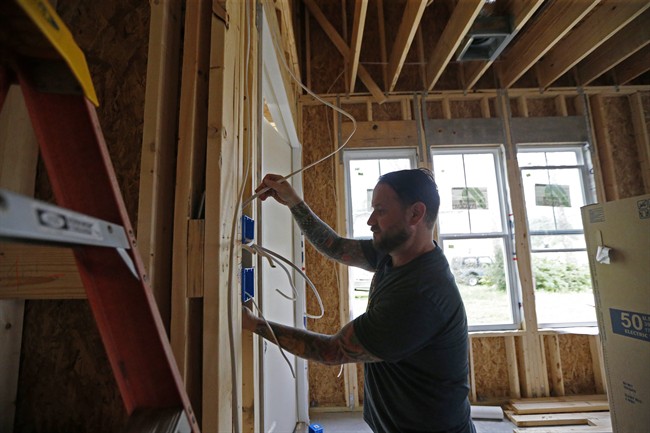The Canadian job market is on a tear. The economy added 45,300 net new jobs in June, far higher than the gain of 10,000 positions that economists expected.

That makes for 314,000 jobs added over the last year, with full-time work driving the growth over the last six months.
READ MORE: New job numbers ‘cement the case’ for an interest rate hike next week: CIBC
But labour market gains aren’t equally distributed across Canada. Newfoundland lost nearly 12,000 jobs over the past 12 months, while the employment needle barely moved in the rest of Atlantic Canada.
READ MORE: Canada’s highest (and lowest) paid regions, by average hourly full-time wage
And although Alberta stands out in the Prairies, with a solid gain of 48,500 positions since June 2016, the province is mostly regaining ground lost during the recession. Calgary, in particular, continues to have the highest jobless rate among Canada’s metropolitan areas.
Wage coverage on Globalnews.ca:
So where are the best places for job-hunters to be?
Here’s a ranking of the provinces and major metropolitan areas based on job creation numbers released by Statistics Canada on Friday.
1) Quebec – 122,000 net new jobs (since June 2016)
Things have rarely been so good in the Quebec job market. At six per cent, the province’s unemployment is the lowest it’s ever been since the record keeping began in 1967.
Quebec may be the “least competitive place for job seekers in 2017,” according to job search site Indeed.com. In a recent survey, the company found that in several Quebec cities the ratio of online job listings to clicks from potential candidates was less than 2:1.
Here’s how major metropolitan areas in the province stack up:
- Montreal: 90,300 net new jobs
- Gatineau: 7,000 net new jobs
- Saguenay: 5,200 net new jobs
- Quebec City: 4,200 net new jobs
- Trois-Rivieres: 1,400 net new jobs
- Sherbrooke: 500 net new jobs
READ MORE: Average hourly wages in Canada have barely budged in 40 years
2) British Columbia – 104,000 net new jobs
Neither the dip in home sales in Vancouver earlier this year nor the ongoing softwood lumber dispute with the U.S. have had much of an impact on the B.C. jobs market. Things keep looking up for local job seekers.
- Posters promoting ‘Steal From Loblaws Day’ are circulating. How did we get here?
- Canadian food banks are on the brink: ‘This is not a sustainable situation’
- Is home ownership only for the rich now? 80% say yes in new poll
- Investing tax refunds is low priority for Canadians amid high cost of living: poll
- Vancouver: 40,300 net new jobs
- Kelowna: 10,300
- Victoria: 9,700
- Abbotsford and Mission (the two are lumped together as one census metropolitan area): 4,100
READ MORE: Canadian provinces ranked by average consumer debt: Equifax report
3) Ontario – 75,000 net new jobs
Ontario’s roaring performance fizzled a little bit in June, with somewhat soft job numbers amid a slowing housing market. And not every community has had an easy ride over the past year. Windsor, in particular, keeps reeling from auto job losses.
- Toronto: 34,000 net new jobs
- Hamilton: 32,700
- Barrie: 11,500
- Kitchener, Cambridge and Waterloo: 7,700
- Ottawa: 7,000
- Kingston: 4,500
- London: 4,000
- Guelph: 2,400
- Oshawa: 2,200
- Peterborough: 1,400
- Thunder Bay: 1,200
- St. Catharines and Niagara: 100 jobs lost
- Greater Sudbury: 400 jobs lost
- Brantford: 500 jobs lost
- Windsor: 6,200 jobs lost
4) Alberta – 48,500 net new jobs
Alberta stands out from the rest of the Prairies, where job growth has been virtually flat. But recent gains still haven’t made up for the jobs lost during the oil price shock.
- Calgary: 38,900 net new jobs
- Edmonton: 7,300 net jobs lost
5) Manitoba – 8,400 net new jobs
- Winnipeg: 5,200 net new jobs
6) Prince Edward Island – 3,200 net new jobs
(No city-level data available.)
7) New Brunswick – 1,700 net new jobs
- Saint John: 2,200 new jobs
- Moncton: 2,500 jobs lost
8) Nova Scotia – 1,500 net new jobs
- Halifax: 2,600 net jobs lost
9) Saskatchewan – 1,700 net jobs lost
- Saskatoon: 2,900 net new jobs
- Regina: 200
10) Newfoundland – 12,000 net jobs lost
- St. John’s: 8,300 jobs lost






Comments